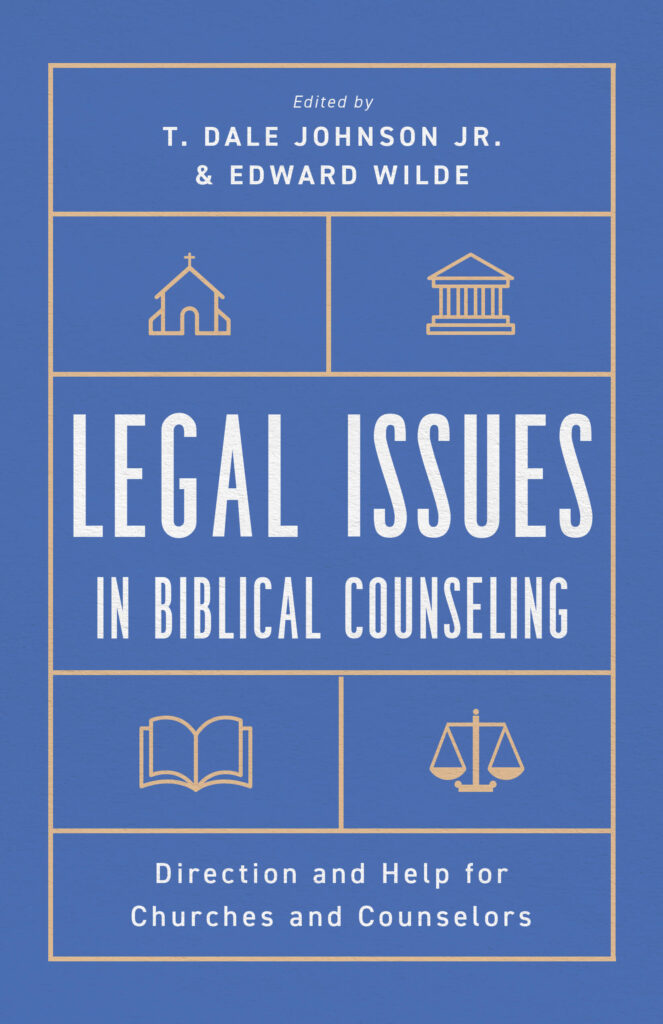Pastor Dan sat alone in the office feeling a bit overwhelmed by anxious thoughts and an uneasy feeling in the pit of his stomach. He had just finished reading an article on his favorite news site describing the attempts of some state legislators to codify requirements for all counselors in his state, which, he presumed, included his counseling ministry as a pastor. The writer mentioned regulations for mandatory reporting, restrictions on counseling homosexual people, and even mandated requirements for anyone who would counsel children.
The uneasy feeling in his stomach turned into a knot as the day progressed, and his thoughts ran down this unwanted track. Are we at the place where it is impossible to shepherd and counsel God’s people without exposing ourselves to some kind of legal action, not to mention prosecution? How can I protect the ministry of counseling? How can I protect myself? What do I need to be thinking and doing in light of the events transpiring in our country? This is not what I thought ministry would be like when I started!
Pastor Dan is not alone in this funk, is he? Many have felt and thought the same things. Is there hope for pastors? Can we protect our counseling ministries and ourselves? Yes, we can! And we can do so in a way that honors God and remains faithful to Scripture. Our Father has not left us alone to figure all this out. Surely, we need the wisdom of those who know and work within the legal system, but we have the Scripture that tells us how we need to think and act in any circumstance, including this one. What are some things that Dan needs to avoid as he confronts this new environment, and what can he or should he do? What is his duty as a pastor? Let’s consider that together.
Don’t Give in to Fear
Many pastors make the choice to quit counseling altogether. After all, if you don’t counsel, you don’t have to worry about civil suits or prosecution. Is this a good idea? Let’s consider this question.
Take, for example, the church across the street that holds a “Blessing the Animals Day” every year. Now, if the legislature determines that having animals in public buildings—including church buildings—is a health risk or dangerously increases the spread of fleas, and it passes a law restricting animals in such buildings, we probably would not go to battle over it (well, most of us wouldn’t). Why not? Because that is not an essential or even biblically mandated ministry entrusted to the church.
Many pastors see counseling in that light. I have many opportunities to teach the fundamentals of counseling, and often, as I stand before a class of about fifty to a hundred people, I ask, “How many pastors do we have here today?” Almost always I will see no more than five hands go up. Why are there so few pastors in those classes? I believe it is because many pastors think, I’ d love to go to that conference, and it would be nice to add counseling to my ministerial repertoire, but my time is so limited. To many pastors, counseling is a nice addition to pastoral ministry but not essential, helpful but not necessary. Nothing could be farther from the truth! Not only is counseling essential; it is at the very core of shepherding—the very core of pastoral ministry!
When Jesus ascended to heaven, he left his disciples with a simple command: “Go therefore and make disciples of all nations, baptizing them in the name of the Father and of the Son and of the Holy Spirit, teaching them to observe all that I have commanded you” (Matthew 28:19). What are we to “teach”? Many reply, “All that Jesus commands us.” But that’s not entirely correct, for Jesus clearly says that we need to teach others “to observe” all that he commands. Counseling is just that. It is all about making disciples, teaching people to obey Jesus in the difficult places of life. One of my mentors, Pastor Bill Goode, defined disciples as “people who translate truth into life.” Have you ever thought of counseling as a means of fulfilling the Great Commission? With that in mind, would you say that counseling is an essential part of the church’s ministry?
Listen to the apostle Paul describe his ministry in Colossians 1:28: “Him we proclaim, warning everyone and teaching everyone with all wisdom, that we may present everyone mature in Christ.” The Greek word Paul uses here for “warn,” noutheteo, can legitimately be translated “counsel.” And so Paul is asserting that he ministers God’s Word both publicly and privately for the purpose of presenting mature believers to Jesus on that great Day of Judgment. Every time I preach and every time I minister the Word in counseling, I think, I need to do this so these folks will be able to give a good account of themselves to Jesus someday. Counseling, indeed, is a ministry worth taking pains to encourage and protect.
Consider what the prophet Ezekiel said to the shepherds of God’s people in his day:
Son of man, prophesy against the shepherds of Israel; prophesy, and say to them, even to the shepherds, Thus says the Lord God: Ah, shepherds of Israel who have been feeding yourselves! Should not shepherds feed the sheep? You eat the fat, you clothe yourselves with the wool, you slaughter the fat ones, but you do not feed the sheep. The weak you have not strengthened, the sick you have not healed, the injured you have not bound up, the strayed you have not brought back, the lost you have not sought, and with force and harshness you have ruled them. So they were scattered, because there was no shepherd, and they became food for all the wild beasts. My sheep were scattered; they wandered over all the mountains and on every high hill. My sheep were scattered over all the face of the earth, with none to search or seek for them. . . . Thus says the Lord God, Behold, I am against the shepherds, and I will require my sheep at their hand and put a stop to their feeding the sheep. No longer shall the shepherds feed themselves. I will rescue my sheep from their mouths, that they may not be food for them.
Ezekiel 34:2–6, 10
Too many pastors, believing that counseling is “optional,” stand condemned by the Lord’s indictment. Many love to preach, but they are afraid to counsel or prefer not to do it. They find refuge from legal problems by referring Christ’s sheep to the licensed counselor up the street.
While that sounds like an easy way to avoid legal danger, it would be failure in terms of being a pastor. As a general rule, we should not refer the people in our charge to a secular counselor. First, that counselor cares nothing for the Shepherd of the sheep or what he thinks is best for them. Second, there is a fundamental difference between providing biblical discipleship and psychotherapy.
Third, it is dereliction of duty. Shepherding is not merely preaching to the sheep, which, frankly, is the easiest and most fun part of pastoring. It also involves strengthening the weak, healing the sick, binding up the wounds of the injured, and guiding them back to the path of righteousness when they stray because of the sin, suffering, and brokenness of this world.
Counseling clearly belongs to the church and to her shepherds. We cannot protect ourselves by abandoning it just because we fear prosecution. As those charged with “keeping watch over” the souls of the sheep and who “will have to give an account” for them, pastors do not have that option (Hebrews 13:17).
Don’t Give in to Anger
Some pastors believe that protecting themselves and their counseling ministries requires all-out war with the governing authorities or, at the very least, making some kind of public fuss about any possible mandates. Years ago, when my state was talking about mandatory reporting, the libertarian in me reared up and snarled, “If Ohio thinks I’m going to become an agent of the state in my office, it had better think again!” Certainly, we have grounds to believe that religious liberty is under threat and our freedoms endangered, but the answer is not always to go to war or flagrantly disobey mandates in the name of liberty. Sadly, evangelical Christians are known more for being cranks who have a problem with just about everyone than for living quietly and minding their own affairs (cf. 1 Thessalonians 4:11).
Romans 13:1–7 and 1 Peter 2:13–17 clearly command believers to submit to the government and foster a reputation as good citizens. Many of you readers have preached on those texts. When you have preached them, what question do you first encounter? It usually is not, “Please, pastor, tell us in greater detail how we should obey,” but rather, “When is it permissible to disobey the government?” In fact, how many sermons have you heard or preached on those texts that did not include caveats on when disobedience is required (even though the texts themselves give no such exceptions)? But we cannot give in to the temptation to disobey the Scripture simply to protect ourselves. We are called to submission so we cannot resort to rebellion just because it might be easier.
Look at Jesus. He lived under oppressive regimes, both religious and political, yet he did not engage in any sort of dramatic rebellion. He quietly, faithfully ministered the gospel to the multitudes that followed him, and he spoke truth to the religious and political authorities that he encountered. In fact, he epitomized one who “speaks truth to power.” But he did not agitate; he did not lead marches and protests. In fact, Matthew says that Jesus fulfilled Isaiah’s prophecy: “Behold, my servant whom I have chosen, my beloved with whom my soul is well pleased. I will put my Spirit upon him, and he will proclaim justice to the Gentiles. He will not quarrel or cry aloud, nor will anyone hear his voice in the streets” (Isaiah 42:1–2, quoted in Matthew 12:18–19, my emphasis). The Servant of the Lord would launch a revolution without clamoring in the streets and gathering about him a gang of spiritual Brownshirts to march against and topple the oppressive system bearing down on him. Shouldn’t his servants operate in the same manner?
That is not to say that one must submit in violation of his conscience, for not even the state is lord of one’s conscience. Nor is it to say that you should abandon any attempt to protect our liberties. But when you must protect yourself and your ministries, the Bible makes it clear that we use different weapons. Fussing and fighting may gain some protection for the time being but at what cost to the reputation of our Savior?
Sometimes we have to remind ourselves that the glory of Christ is more important than freedom and protection. That does not mean you surrender yourself to an inevitable loss of religious freedom and protection. It does mean that you work wisely in the legal system in which God has placed you.
Excerpted from Legal Issues in Biblical Counseling: Direction and Help for Churches and Counselors ©2022 by T. Dale Johnson Jr. and Edward Charles Wilde. Used by permission of New Growth Press. May not be reproduced without prior written permission.






